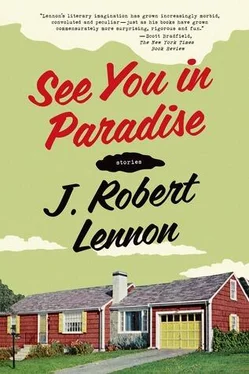“No, and maybe you should.” He crossed his freckled arms over his scrawny chest. “Trains are cool. I like trains. Why don’t you show me your stuff more often?”
“I don’t want to.”
“Right! There’s the problem! Sometimes I think we should see a counselor or something.”
“A roommate counselor?”
“A relationship counselor.”
“We’re not in a relationship.”
“We’re in a roommate relationship.”
And so on. Thus, I had managed to avoid being lured into the dark heart of Weber’s personal space, which in my opinion had, in the form of his incessant demand for attention and approval, encroached upon the rest of the apartment enough already. But then, apparently dissatisfied by my resistance to his overtures, he began to borrow my books. I came home from work one night, ate (I had managed to get him to stop serving me meals, though not to stop him demanding grocery money for the meals he would continue to offer to make me), showered, put on my pajamas, and went to bed with a good heavy train book. Then John Weber walked in.
“Hey dude.”
“What do you want, John.”
He came and sat on the edge of my futon, which lay on the floor in the corner as it had ever since Ruperta took our bed. I scootched my legs over and pulled up the covers to my chest.
“I wanted to return your book,” he said and handed me New Innovations in Rail Travel 1982–1992.
“Where did you get this?”
“I borrowed it.”
“From where?” I demanded.
“Right there, man.” He pointed to one of the enormous sagging homemade bookshelves that lined the walls of my room.
“You came in here and took my book?”
“Not took. Borrowed. There’s a difference.”
I wanted very badly to debate the precise difference between taking and borrowing and establish definitively which of the two he had done. But I also wanted him to leave immediately. For a moment, I was suspended between these contradictory channels of annoyance, and in that weightlessness felt the presence of a terrifying possibility: that John Weber’s obliviousness and intensity were, in some twisted way, actually profound. That there was substance to him, a substance that I would forever lack. My heart spasmed and I capitulated. “Thank you,” I said and stared daggers at him until he left.
But the next night, when he was at Sandy’s place, I couldn’t find a particular hobo oral history I was looking for, and I became convinced that Weber had taken it away to his inner sanctum. And so I threw open his door and plunged in, expertly flipping the oddly-placed switch — it was two feet from the doorjamb and about nine inches too high — that I remembered clearly from the days when Ruperta used the room as an office. At which time I saw that Weber was not, in fact, at Sandy’s — he was right here in his room. Except he was a uniform medium-gray color, and his body was missing below the neck.
Of course I screamed. You, too, would have screamed. I want to scream today, remembering it. Weber’s head. It sat on top of — appeared, in fact, to be growing out of — a miniature chest of drawers in the corner of his room. It was made of modeling clay. John Weber, sculpturist. The head was life-size; it rested upon a sturdy neck, which thickened into what should have been shouders, but in fact was merely a broad smearing of clay that covered the top of the bureau and extended partway down the sides. This head was extraordinarily, horrifyingly realistic. The flared nostrils, the slightly uneven ears, the chinless chin — they were all perfect. The head was so fabulously accomplished that it brought out details I didn’t notice that I’d noticed on the real John Weber — the lines around the eyes, the pockmarks on the forehead, the crookedness of the teeth. He even had the smile down right — that awful half smirk, simultaneously innocent and calculating, relaxed and desperate, brilliant and moronic.
How was it possible that John Weber could see himself so clearly? He was the most obstinately unobservant person I had ever met. Of course, there was his epic, heroic narcissism; that probably explained it. To one side of the head, attached to the wall, was a foot-square mirror where, no doubt, he studied his face as he worked. This, I surmised, must have been the real reason he invited me into his room. The music was a ruse. He wanted me to see — to admire — the head.
When he came home late the next morning, I watched him more closely than usual, hoping to learn how I had missed this hidden talent. He seemed to appreciate the extra attention and became voluble.
“Have a good night?” he asked me.
It gave me a bit of a shock. Did he know, somehow, that I had gone into his room? I was feeling bad about it, as I had later found the hobo book hidden underneath a corner of my futon. “Fine,” I said cautiously. “And you?”
“Oh,” he said, with a smarmy touch of wistfulness. “I guess so.”
“Is something wrong?”
He exhaled loudly, pretended to consider before speaking. “Let me ask you something.”
“Okay …”
“What do you think of Sandy?”
“Ahh … she seems … very nice.”
“Well, of course she’s nice. She’s very nice. What I mean is … I’m afraid maybe we’re a bad match.”
“How so?”
I’d been alone on the couch, and now Weber flopped down next to me and swung one leg over the other. He wore a thick fleece zippered sweatshirt and, like Sandy, an unseasonable pair of many-pocketed khaki hiking shorts.
“Well, there’s the age difference, for one thing.”
I shrugged. “She’s not that much older.”
“You mean younger. I’m not that much older, you mean. That’s it though, I kind of am. I mean, I think she thinks of me as being like a mentor or something. You know? I’m so much more talented and mature than her, it’s like I’m like her father. Or actually I’m nothing like her father, I’m like another father.”
“How old is she, exactly?”
“She’s nineteen.”
I could only blankly stare.
“I know, I know, robbing the cradle, right?” He stood up now and began to pace. “Her parents totally hate me. They think I’m corrupting her or something. Which is totally crazy since I don’t even believe in sex before marriage.”
“You don’t?” I said.
John Weber laughed. “No, of course not, are you nuts? That’s a recipe for disaster. And don’t tell her I told you because this is totally private and secret but Sandy is not a virgin at all , and her parents don’t know obviously, and that’s what’s crazy, I’m keeping her on the straight and narrow, not corrupting her!”
“Wow.”
“And I am very cool with that. With her having sex, like, in her past. I mean, I still respect her and all. But I dunno, I mean, she wants to have sex and kiss and all that, because she’s used to it I guess, but at this point if I did that stuff it would be like doing it to my daughter or something, on account of this being-like-her-father thing. Not like her father,” he self-corrected, “like a second father.”
“You don’t kiss?”
“On the cheek.” He blushed. “Sort of neck, too.”
That was enough for me. I stood up. “I have to go to work,” I said.
“No you don’t. It’s only ten thirty.”
“There are errands I need to do.”
“The next bus won’t be here for half an hour.”
“I am going to walk to town.”
His raised his eyebrows. “You are? That’s so cool. I am coming with you.” He went to the coatrack and shrugged on his jacket. “I have to get some fresh air and straighten all this out in my head.”
Did he say “my head” with special, slightly fey, significance? I believe that he did. I did not want to walk the two miles to town, let alone with John Weber, but that’s what I ended up doing, and in retrospect it was a good thing, because I bumped into Ruperta. In order to get away from Weber as quickly as possible, I had pretended to need something at the first retail business we passed, a fishing and hunting supply store at the edge of town.
Читать дальше












